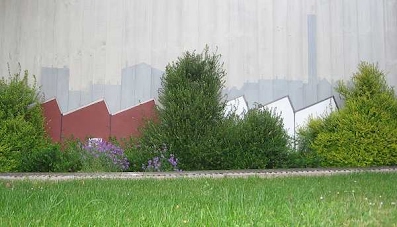by Cheeseminer
The Flatland & Washes Railway runs through the region known as East Flatlia. It has its own distinctive industrial heritage arising from the strong deposits of cheese ore in this area, and specialist services such as spirit-level calibration. This page describes some of those industries... |
Cannon Bear

Cheese Oil for the discerning explorer.
Cheese oil can be extracted from the natural ore of certain types of cheese, in particular Breeite and Caembaerite. The process is similar to the extraction of mineral oils from rock shale. The cheese ore is crushed into down to the level of small stones and then heated in a tilted rotating drum. The oil separates from the ore and is collected at the lower end of the mechanism. The dry white residue is useful in concrete mixes and is used as ballast on the railways.
DHAFT
DHAFT produce a range of industrial flexible laminates used widely in the building industry. Their most popular product is "DHAFT Yellow Slices" named for it's distinct bright colour and the way the laminate panels are 'sliced' from a larger slab of recycled plastic. It's most common use is as a strengthener between layers of light fibrous building insulation.A more recent product is "Soylent Green" which is similiar in function to the yellow product (but green, obviously). It is said to be 'organic' in nature although the environmental lobby remains unconvinced of the company's true 'green' credentials. Nevertheless, it does seem that this new product is more efficient to produce as the company workforce has been reduced considerably since it's introduction.
Locally, DHAFT has a processing plant in Bider Fens, adjacent to the line between Bider Fens and Redbridge Docks.
Both products are shipped as panels approximately 6ft square.
Gordon Zola
Polish aromatherapist.
M. N. Tarrl. (Holesalers)
M. N. Tarrl & Co. import holes from Iceland where an over abundance of holes can lead to minor geological events (although these same geological events are a significant contributor to Iceland's tourism industry, so the balance of holes has to be carefully controlled.). Holes are widely used in a number of industries.The transportation of holes on the railway is a complex matter. If a wagon full of holes isn't treated carefully the holes are liable to coallesce, forming larger holes, and the weight of these may lead to structural damage to the wagon. Worst case, a spillage of holes onto the track can lead to derailments. In a particularly bad accident in 1953 a hole being transported from Lower Ditton to New Holeand came dislodged from it's flat wagon and the following two box vans became embedded in the hole. It required a 45ton mobile crane to pull them out of the hole. The hole itself was badly damaged, and after being raised to ground level by underfilling with soil, it was left beside the track.
These days, engineering holes are transported in sheets of stainless steel, or wire meshes can be used to carry grids of flat square holes.
Parmy Sons
Featured on the Tony Robinson's "Flatlandia's Worst Jobs in History" - the less said about freeze dried vomit the better.
Jarlsberg
Widely considered to be, probably, the producer of one of the best de-greasing fluids known. In particular, the 'Spetzial' brand degreasing fluid must be treated with extreme care as it's been known to dissolve materials other acids leave untouched: brass, concrete, fingers,... (hence the traditional "brass, blood and bandages" colouring of its containment vessel).
Portsaloo
Temporary toilet facilities for hire.

